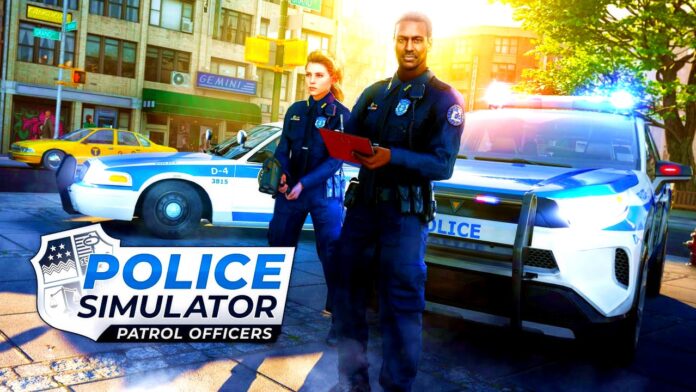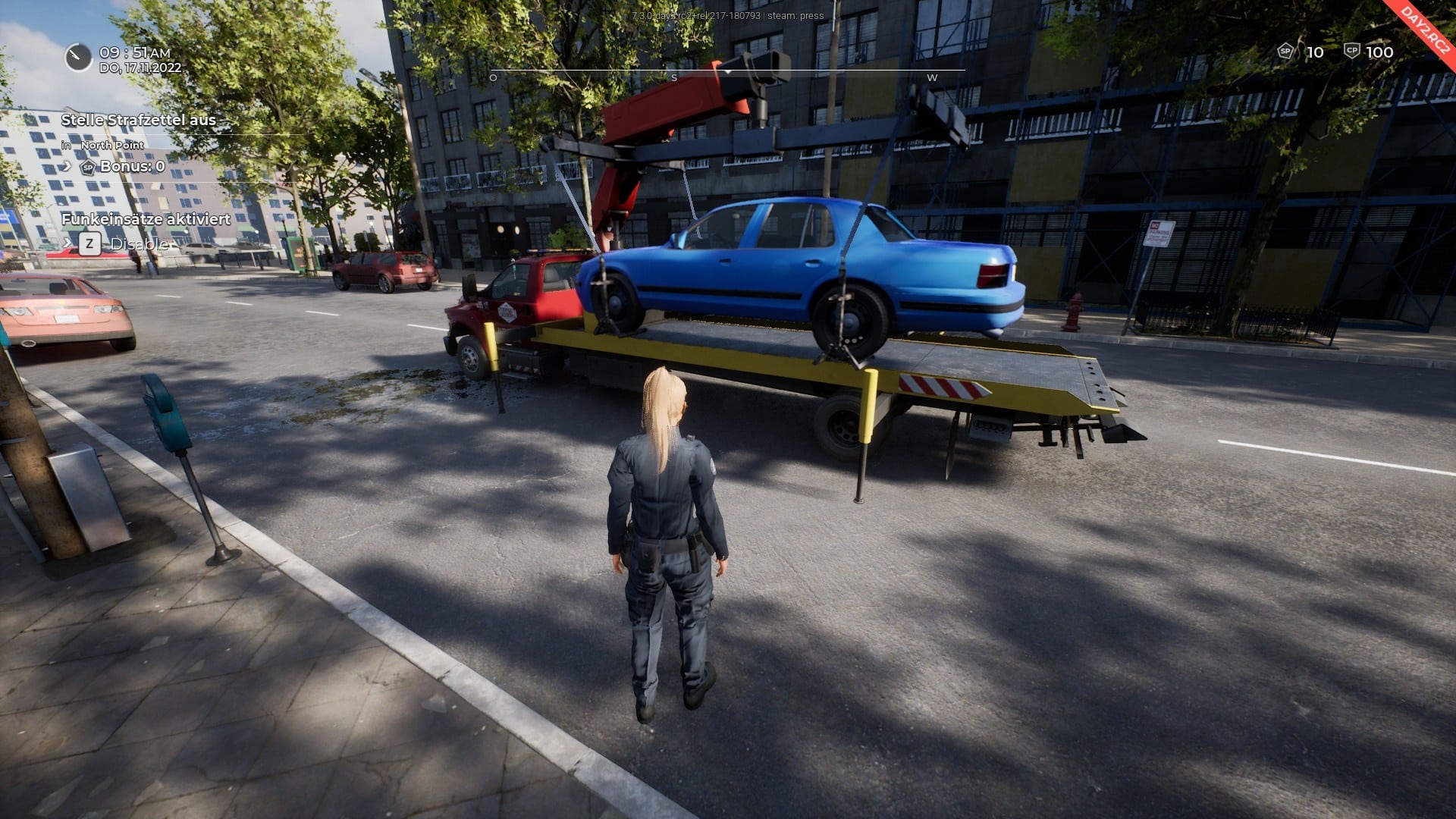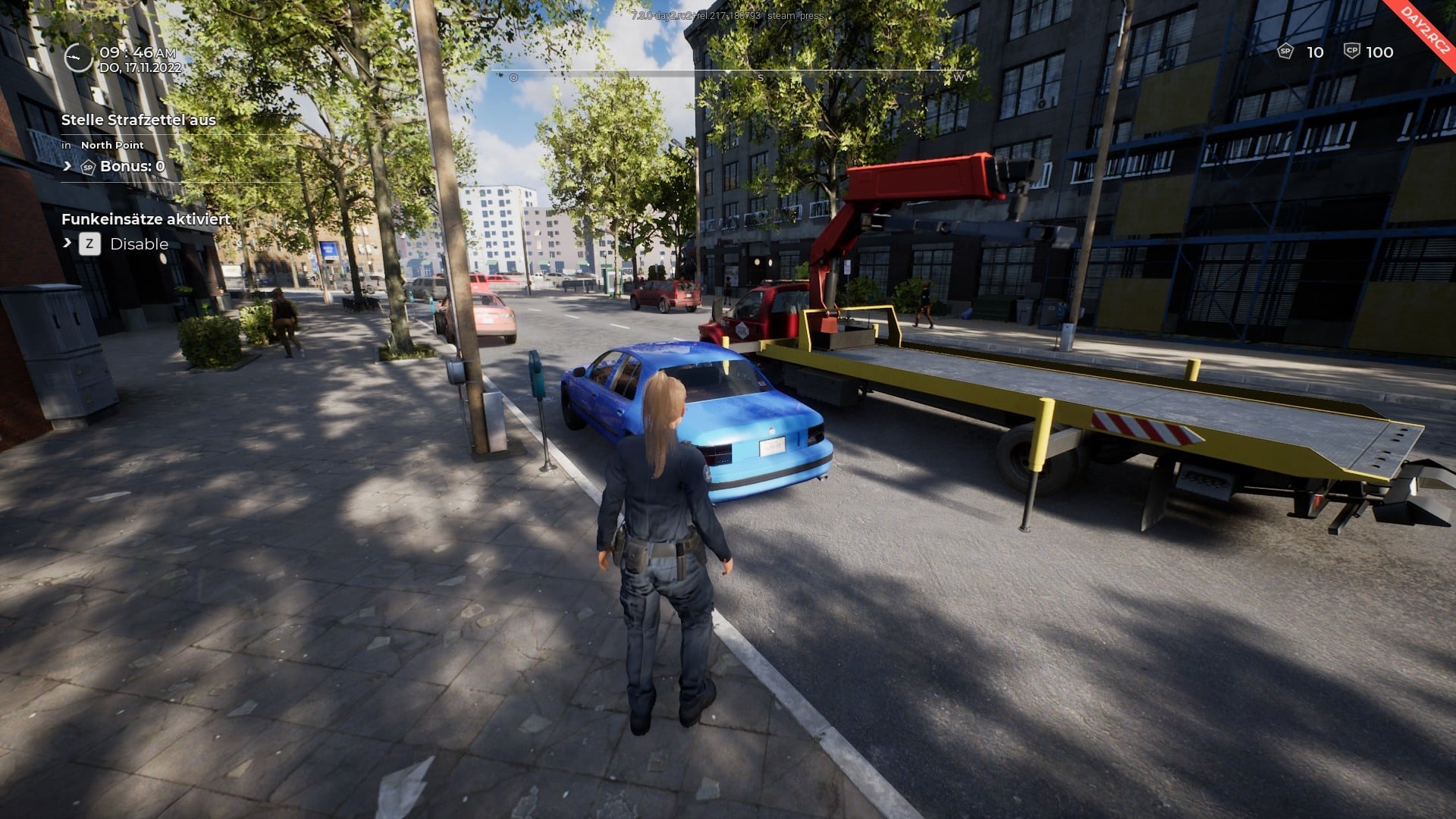Police Simulator: Patrol Officers surprised us in the test, because this time we can leave the otherwise obligatory parking ticket for police games behind.
Combining an everyday simulation with one of the reasons par excellence for shining children”s eyes is not a bad idea. We already saw that a good year ago when Astragon”s Police Simulator: Patrol Officers went into Early Access and hinted at great potential in the test. In the meantime, the police simulation developed by Aesir Interactive has been released as a full version. In our test of the release version 1.0, we take a look at whether the degree from the cadet school is enough to survive on the streets.
Table of Contents
The name says it all
Police Simulator: Patrol Officers is not a name you want to pronounce fluently three times in a row during a breathalyzer check – and yet it gives a very accurate description of the game. Because that”s exactly what it”s all about: In the role of a virtual law enforcement officer, we ensure law and order on the streets of the fictitious US town of Brighton, either alone or with a partner in co-op.
In the campaign, we perform our duties in three larger city districts, which are divided into several small areas called “neighbourhoods”. Unlocking them bit by bit and thus having access to better equipment as well as varied scenarios is one of the driving forces of the career.
Career is the right keyword here, because due to the lack of plot and characters, “story” is not a correct term for the single-player mode. But that is not a problem, because that is how Police Simulator: Patrol Officers works. But anyone expecting a narrative will be disappointed.
Apart from the choice of our game character (three male and three female police officers with predefined looks), we do not make any major decisions. Furthermore, a career is such that we start with little and are only given larger tasks and the necessary tools as the game progresses.
On patrol
We haven”t only known that all beginnings are hard since “Lethal Weapon 3″, when the two chaos cops Riggs and Murtaugh are demoted to simple patrol duty again. But if we act just like the lawmen played by Mel Gibson and Danny Glover in the game, we will see the end of the shift sooner than we would like. We start our patrol in one of Brighton”s many, but visually almost identical police stations, which only serve as the starting and ending point of a shift.
In the run-up, we select the desired district on the city map as well as the shift type and length. Already for the first shift, we choose a time frame between 15 and 90 real minutes. We like this flexibility very much, because it allows us to adjust the length of the assignment to our time and desire. Later in the game, we unlock the vehicle patrol in addition to the foot patrol and go out to check on things not only in the morning, but also in the evening and even at night.
But at first we have to write parking tickets. What sounds banal at first is not only an essential part of a US cop”s job. While tracking down parking violators, we get to know the game system, make our first – sometimes wrong – decisions and are amazed at all the things we have to watch out for when parking cars.
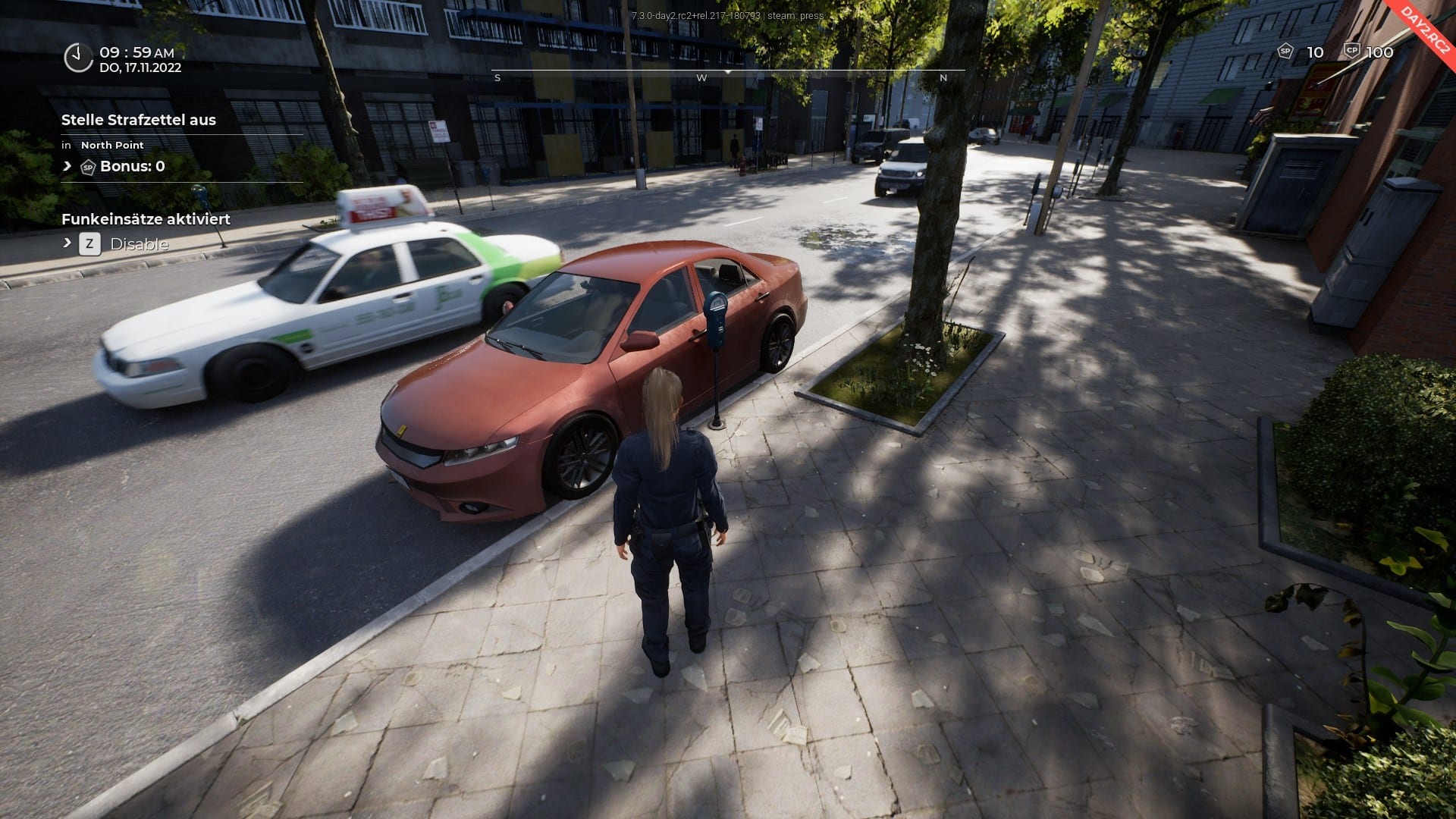
The law is our friend
Basically, there are two difficulty levels in Police Simulator: Patrol Officers: an easier one with appropriate help texts (which are omitted in co-op) and a harder one without help. Switching is possible at any time during a running game.
Those making their first experiences on the road should first try the easy mode. Besides the help texts, the mobile police computer is our best friend. Especially during the first shifts, we repeatedly call up the inventory that can be displayed via the tab key and look at our duty manual.
The almanac for law enforcement officers contains important explanations for appropriate behaviour in different situations. In our search for parking violators, we quickly ask ourselves when a parking ticket is sufficient and when we have to call a tow truck. Once we have made a decision, we have to live with it: If we call a tow truck because of an expired parking meter, this is considered disproportionate.
Every such action costs us behaviour points. We have 100 of these at the start of the shift – and when the counter reaches zero due to our negligent actions, the game is over. While a wrongly towed car only costs a few points, we give away our badge (and gun) directly if we use our service weapon improperly. For good actions we collect shift points, which we use to collect ten stars in each of the three city districts and thus unlock new equipment and tasks.
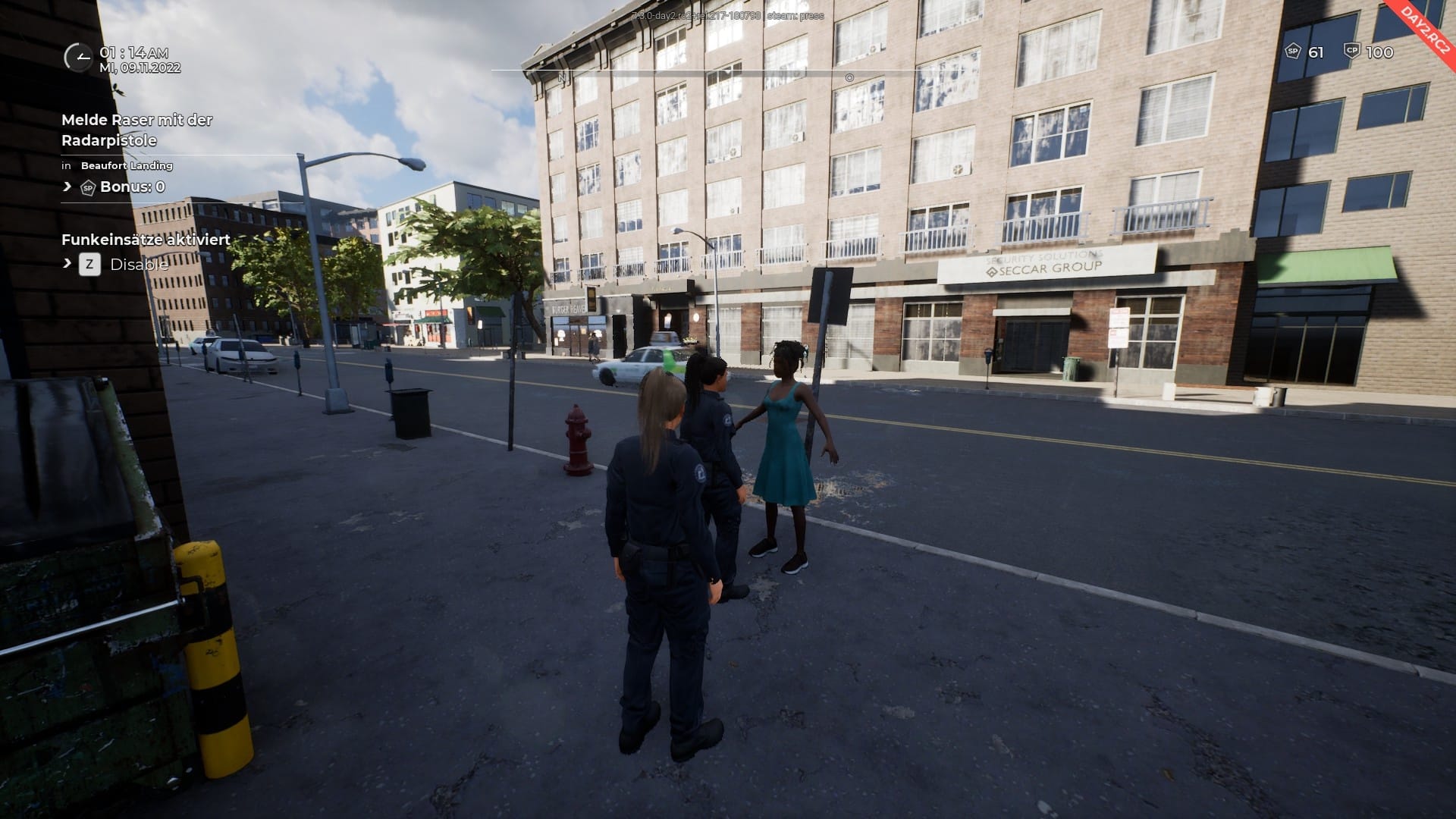
We are the good guys
After a few shifts, we rarely reach for the manual, but are glad to have it in any situation. In the meantime, we recognise parking violations immediately, convict speeders with the radar gun and even record our first accidents. Each shift has a main task for which bonus points are awarded, such as writing parking tickets.
However, we are free to fight crimes of all kinds. As the game progresses, there is more going on in Brighton during our shifts, so we have to take action more often. In addition, we are informed by an on-screen message when someone in our vicinity has committed a crime.
The ideas are good, because on paper this gives the missions more variety and spontaneity. However, the practice is different. Once we chose a patrol with a patrol car and were given the bonus task of issuing parking tickets. This doesn”t add up.
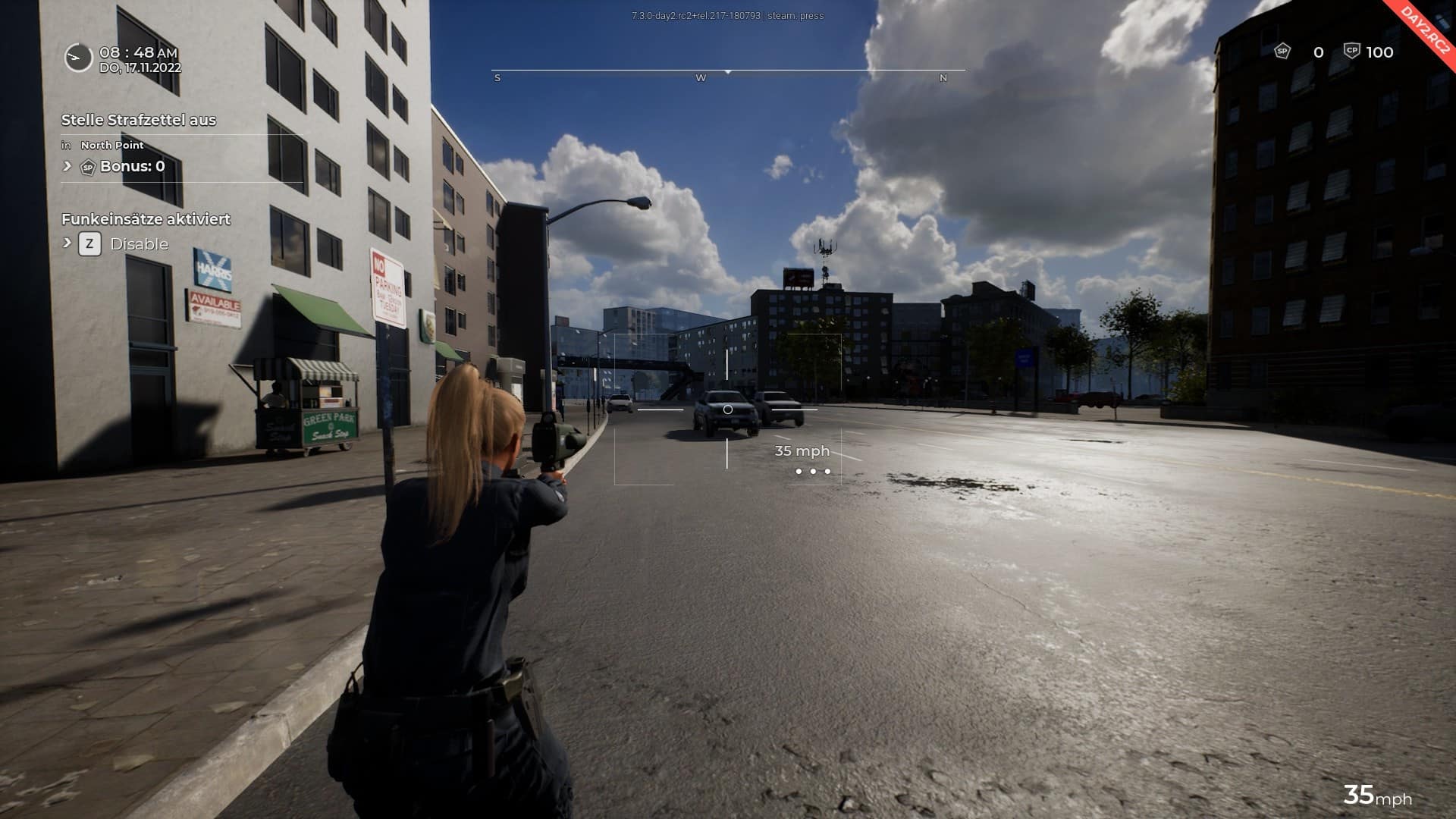
What”s worse is the random crimes in the perimeter. When we get the message “This person has crossed the road without permission”, we often stand there and look for a person with a very inconspicuous yellow arrow over their head. Finding the person in time is still far too difficult at the moment.
To make matters worse, in co-op games not both players always pop up the respective messages and overlays. Smaller control panels are also annoying – for example, passers-by greet us and we respond by pressing a button. Often, however, the time window is so short that the aforementioned keystroke triggers a conversation.
If an NPC in the area commits a crime, we receive a message and have to look for a person marked with a yellow arrow. Rarely is this as easy as in this picture.
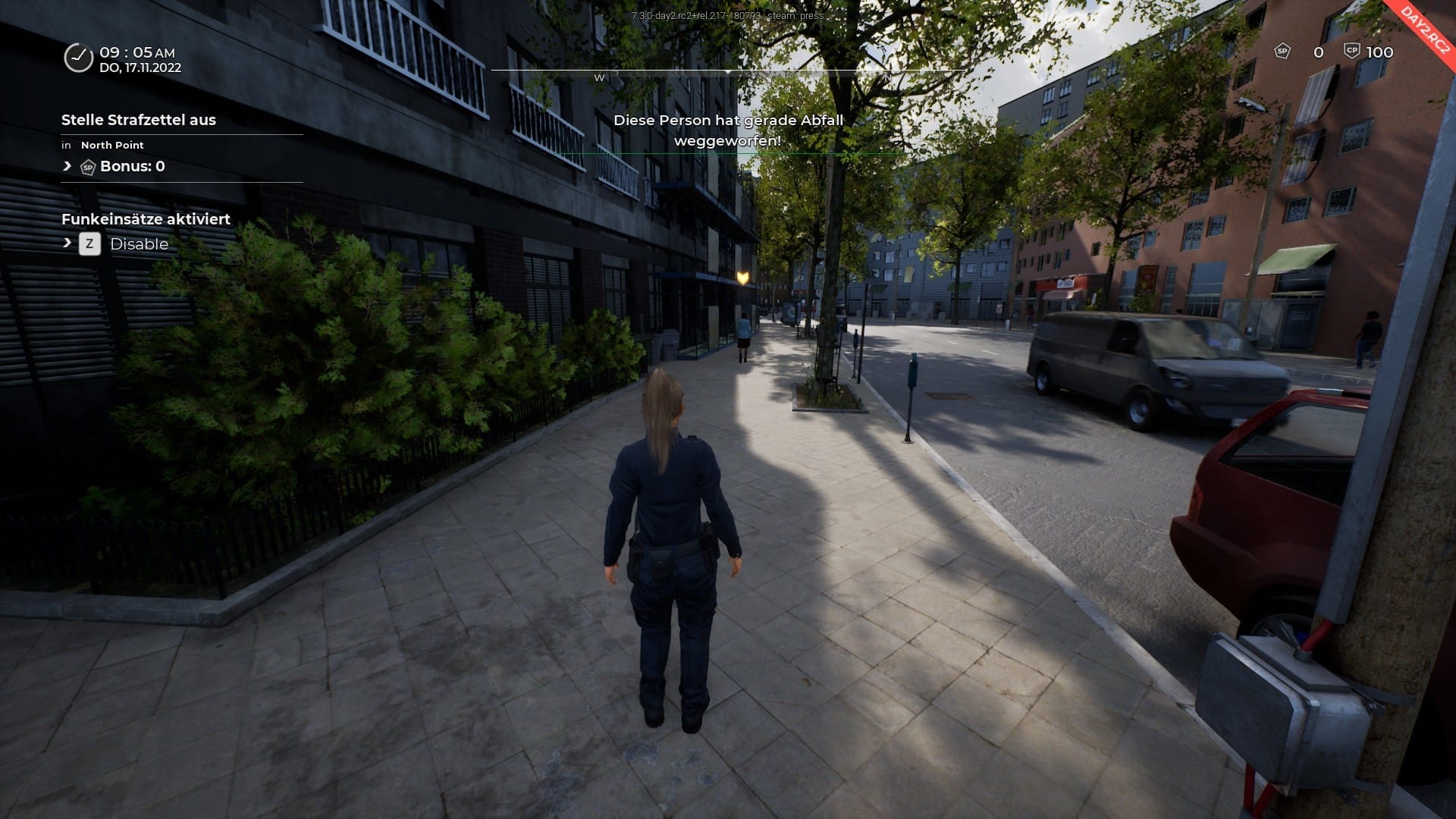
Criminal clipping
Talking about technology: It basically runs smoothly. In the test with a released pre-release version (without a Day One patch), however, we also noticed some quirks. For example, cars and people clip into each other, which makes for unintentional comedy. When we arrive at an accident scene and an accident victim is standing casually in his car, it makes the situation absurd. Passers-by like to stretch all their limbs in conversation and the animations of the characters also look a bit stiff.
Police Simulator: Patrol Officers is not Alarm for Cobra 11, but a professional simulation. You have to be aware of that before you buy it. It is also clear that it is not a AAA production. For 30 euros you get a decelerated, thoroughly exciting and well thought-out interpretation of everyday police life, with an initially steep learning curve, a lot of routine and, in the final analysis, little consistency. However, the game is fun for 12-15 hours and unfolds its magic especially in co-op mode with friends. When, as the game progresses, the scenarios and missions become larger and both partners work together, these are the Police Simulator”s strongest moments.
Editorial conclusion
You could already read in the multiplayer article that I can have fun with Police Simulator: Patrol Officers. I still think so, because the missions as a virtual law enforcement officer are entertaining. Especially in co-op mode, you can play in a very relaxed way and chat a bit on the side. But be careful not to underestimate the complex game mechanics. The grading system and the work guidelines in the manual create the motivation to want to do everything by the book and be a good policeman. As the game progresses, the missions become more varied and extensive. We are always flexible when it comes to scheduling.
However, routine sets in relatively quickly, which is okay at a price of 30 euros. Less okay are various clipping errors, stiff animation and vehicles that are difficult to steer, as well as little consistency in road traffic, which leads to unintentionally absurd situations. Basically, however, I recommend the game to anyone who can do something with such simulations.

